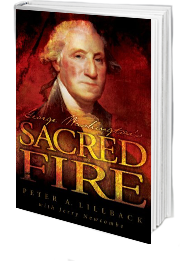What’s In Your Wallet?
Virtually not a week goes by without some sort of lawsuit or complaint against a reference to God or Jesus in the public arena. Oftentimes these lawsuits or complaints run along the lines of, “I’m offended,” and that settles it. So the Ten Commandments have to go. God has to be chiseled out.
Yet our national motto remains “In God We Trust.” It has been since 1956. These words are chiseled in stone above the Speaker’s platform in the House of Representatives. Anyone can see by a review of U.S. money how God’s hand helped create and sustain this nation—all of it declares, “In God We Trust.” What’s in your wallet? Many reminders of our nation’s godly heritage.
Stephen McDowell, cofounder of the Providence Foundation, explains: “You pull out your dollar [and] you see George Washington’s picture, the father of our country who is a Christian man who reflected it in his actions and in his words.”
For instance, in his “Circular to the States” (June 8, 1783), Washington said to all the governors that we could never hope to be a happy nation unless we learned to humbly imitate Jesus, whom he called “the Divine Author of our blessed religion.”
During his first Inaugural Address, he said, “No people can be bound to acknowledge and adore the Invisible Hand which conducts the affairs of men more than those of the United States. Every step by which they have advanced to the character of an independent nation seems to have been distinguished by some token of providential agency.”
The same concept of gratitude to God for His help can be seen on the back of the dollar bill. On the left, we see in Latin this phrase: Annuit coeptis, meaning, “He has favored our undertakings.” As in, God has helped us win our independence.
As Stephen McDowell notes, “God has blessed our undertakings because the founders believe that God and His providence had overseen the birth of this nation and that is reflected there…. There are many miracles God did during the American Revolution, but the greatest miracle was that thirteen sovereign, independent states could gather together to unite to work together as one. John Adams said it was like making thirteen clocks strike together in unison.”
Go back to the wallet and pull out a five-dollar bill, and we see Abraham Lincoln. During the dark days of the Civil War, on March 30, 1865, our sixteenth president called for a national day of fasting and prayer. He reminded the country, “We have been the recipients of the choicest bounties of Heaven. We have been preserved, these many years, in peace and prosperity. We have grown in numbers, wealth and power, as no other nation has ever grown. But we have forgotten God.” When a group of black citizens gave him a Bible in 1864, President Lincoln said, “In regard to this great book, I have but to say, it is the best gift God has given to men. All the good the Savior gave to the world was communicated through this book. But for it we could not know right from wrong.”
If we pull out a ten-dollar bill we see Alexander Hamilton, who was the first Secretary of the Treasury, under George Washington. Hamilton had attended the Constitutional Convention in 1787 and later wrote to a friend, James Bayard: “Let an association be formed to be denominated ‘The Christian Constitutional Society,’ its object to be first: The support of the Christian religion. Second: The support of the United States.” His death in a duel that he did not want to participate in ended that plan.
If we pull out a twenty-dollar bill we see Andrew Jackson, our seventh president. He said that the Bible is the “rock upon which our republic rests.”
On the fifty-dollar bill is the face of Ulysses S. Grant. Although he seemed to have a serious problem with drinking, even he apparently made his peace with God by the end of his life. He once declared of the Bible, “To the influence of this Book are we indebted for all the progress made in true civilization, and to this must we look as our guide in the future. ‘Righteousness exalteth a nation: but sin is a reproach to any people.’”
Finally, a one-hundred-dollar bill has the face of Benjamin Franklin, a man who apparently was not an orthodox Christian. Yet even he saw the importance of Christianity in society. He did not believe it was wrong for public officials to pray. In fact, he encouraged it. Franklin called for prayer at the Constitutional Convention (June 28, 1787), saying: “I have lived, Sir, a long time, and the longer I live, the more convincing proofs I see of this truth—that God Governs in the affairs of men. And if a sparrow cannot fall to the ground without His notice, is it probable that an empire can rise without His aid? We have been assured, Sir, in the Sacred Writings, that ‘except the Lord build the House, they labor in vain that build it.’ I firmly believe this; and I also believe that without his concurring aid we shall succeed in this political building no better than the Builders of Babel: We shall be divided by our partial local interests; our projects will be confounded, and we ourselves shall become a reproach and bye word down to future ages.”
Thankfully, a variation of Ben Franklin’s request for prayer at the Convention was adopted, and they were able to successfully complete the Constitution.
What’s in your wallet? One reminder after another that we are still one nation under God.

